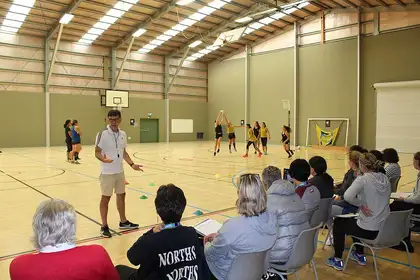
Associate Professor Dennis Slade from the School of Sport, Exercise and Nutrition.
By Associate Professor Dennis Slade
Fun was the most frequently used term at the launch of a new youth sport idea from Sport New Zealand. Commentators from the major sports joining the promotion, namely rugby, cricket, netball, football, hockey and basketball, all at one time or another said, in relation to playing sport, "kids just want to have fun".
The idea is designed to improve the retention of young people in sport and while other terms were bandied about, having fun was pitched as the driver to keep adolescents playing sport.
The problem is, if fun is the central focus as the means through which adolescents will be retained in playing sport, then unfortunately, it is not enough. While having fun is important, the real focus should be enjoyment.
Enjoyment has a subtle, but important difference to fun. Retention of adolescents in sport is, in the main, governed by competence. Competence is considered so important for retaining youth in sport it is given a name, the competency barrier.
The pre-adolescence barrier is contextualised as the extent to which a young person can exhibit a measure of control of the fundamental game or sport skills in which they are engaged. Without the necessary competence they are unlikely to continue with sports as adolescents or adults. It is commonsense.
Few among us persevere in an activity where we do not succeed. Yet if we achieve some competence and success, we are more likely to enjoy the activity and persevere with it. The retention is driven by feelings of self-efficacy through competence. We can have fun because we can do meaningful things in the sport or game.
Although there is much to admire in this move from Sport NZ, fun is such a fleeting quality and in sport it is only a short-term outcome that it might not be the best focus to achieve the intended ends of playing retention.
For example, fun in physical education circles is often described as rolling out the ball – a full class fun game with little or no attempt to instruct anything. Another term is "busy, happy good" – the class is busy, apparently happy and well behaved – but nothing is being taught.
We know how to teach coaches and teachers to instruct for competence in fun and enjoyable ways. Through integrated learning strategies it is also known how to capture the interest of those to play sport, who feel sport as it has been traditionally delivered does not excite them.
In my observations such holistic strategies are not pursued by the local tennis or football coach. They want to develop a tennis player or footballer and beyond those admirable goals, they typically do not have a wider educational agenda, which is so important to capture those on the fringe of playing or carrying on with sport as adolescents or adults. However, we know how to prepare teachers and coaches with the skills to teach or coach in that holistic way, it takes time.
It will be interesting to see if the Sport NZ idea includes provisions to achieve those ends. Given community coaching is undertaken by an army of volunteers, to do so will be an expensive and intense exercise. It will take more than a booklet in a pack with a whistle and a sponsor's voucher.
My fear though is just as students quickly see through the fun roll-out-the-ball strategy in physical education, get bored and eventually become disruptive, if we don't ensure the coaches and teachers can deliver more than fun, increased retention by adolescents in sport may be problematic.
Dr Dennis Slade is an Associate Professor in the School of Sport, Exercise and Nutrition.